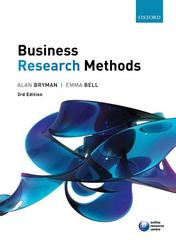Answered step by step
Verified Expert Solution
Question
1 Approved Answer
From: Munson, Ronald. INTERVENTION AND REFLECTION . 6 th ED . , Belmont, California: Wadsworth Publishing Company, 2 0 0 0 . Page no .
From: Munson, Ronald. INTERVENTION AND REFLECTIONth EDBelmont, California: Wadsworth Publishing Company, Page no Decision Scenario # The ad in the newspapers was simple and uninformative: Subjects male and female wanted to participate in scientific study. Must be or over. $ per hour.? Karen Barty wrote down the address. She could use the money, and in $ an hour wasn?t bad pay for what was sure to be very little work. Besides, the hours were probably flexible, and she could fit the time into her class The next Tuesday morning at ten oclock, Karen and nine other people reported to Room of the Basic Sciences Building in the Western Medical Center. A man, who introduced himself as Dr Carlo Raphael, explained what would be required of them as research subjects. First of all, you must sign consent forms,? he said. These state that you are voluntary participants in this study and that for your assistance you will receive a financial reward. If you are not willing to sign the forms, then we cannot accept you as a subject.? He interrupted himself to pass out badly mimeographyed sheets of paper that had Voluntary Consent of Research Subjects? printed at the top. Karen signed hers at once, without bothering to read it The others in her group, she noticed, did the same thing. After filling out a questionnaire and a break they returned and were given sugar cubes. Let the cube dissolve in your mouth,? Dr Raphael had told them. Then have some water, if you like, but don?t eat or drink anything else.? It was disgusting, eating plain sugar. But within twenty minutes, Karen knew that it wasn?t just plain sugar. She was sitting on one of the sofas talking to another woman about an English group called the Beatles. The woman had never heard of them, and Karen spelled the name for her. But as she started to spell it she suddenly found it was hard to concentrate. She knew where she was and what she was doing, but the woman in front of her began to look strange. The woman?s face seemed to be surrounded by a halo of brightly colored light, then her features became twisted and distorted. Karen gave up trying to talk. Somewhere at the back of her mind, she felt fear and confusion. But what was happening to her wasn?t unpleasant. It was interesting, really, and she surrendered herself to the fantastic images that seemed to take over her mind without her being able to control them. Somewhere in that time, she fell asleep or at least she thought she did. She vaguely remembered one of Dr Raphael?s assistants holding her by the arm and leading her back to the classroom. She tried to talk to him, but she wasn?t sure what she said. When she was handed another test booklet, she was surprised to find how easy it was to fill out the answer sheet. By five oclock that afternoon, Karen was herself again. It was not until seventeen years later that she realized she had been an unwitting participant in a research project sponsored by the army to determine the psychological effects of LSD In a number of people were subjected to drugs as part of experimental testing. They were paid for their participation but were not informed as to the exact nature of the drugs, what they might produce as side effects and what danger there might be The drugs were hallucinogenic, including LSD Should the tests have been performed in this manner? How would someone respond to this situation using the ethical principles of: Respond using the principles of the ethical tradition for your group Your group is assigned according the letter that starts your last name HL a rule utilitarian? Start a New Thread
In when the situation in Goi Nigeria was exposed, did Shell take accountability? Please
answer yes or no; explain your findings.
By years later, what was the state of the village of Goi?
There is fear and hesitance in Nigeria when it comes to protesting international climate crimes, in
this region mainly relating to oil companies. Why? What happened in
Shell used tactics to delay the proceedings. Please name at least tactics they used in the
spectrum of international law and what were the results of these manipulative strategies.
years after the Goi oil spill and more than a year after The Hague ruled in Eric Dooh's case, the
legal teams continue to negotiate a compensation package for the plaintiffs. Eric is now in his
Please comment on how you feel about the whole process, ie is it fair? What do you think needs
to change in our International Law system to prevent similar tragedies to happen again?

Step by Step Solution
There are 3 Steps involved in it
Step: 1

Get Instant Access to Expert-Tailored Solutions
See step-by-step solutions with expert insights and AI powered tools for academic success
Step: 2

Step: 3

Ace Your Homework with AI
Get the answers you need in no time with our AI-driven, step-by-step assistance
Get Started


